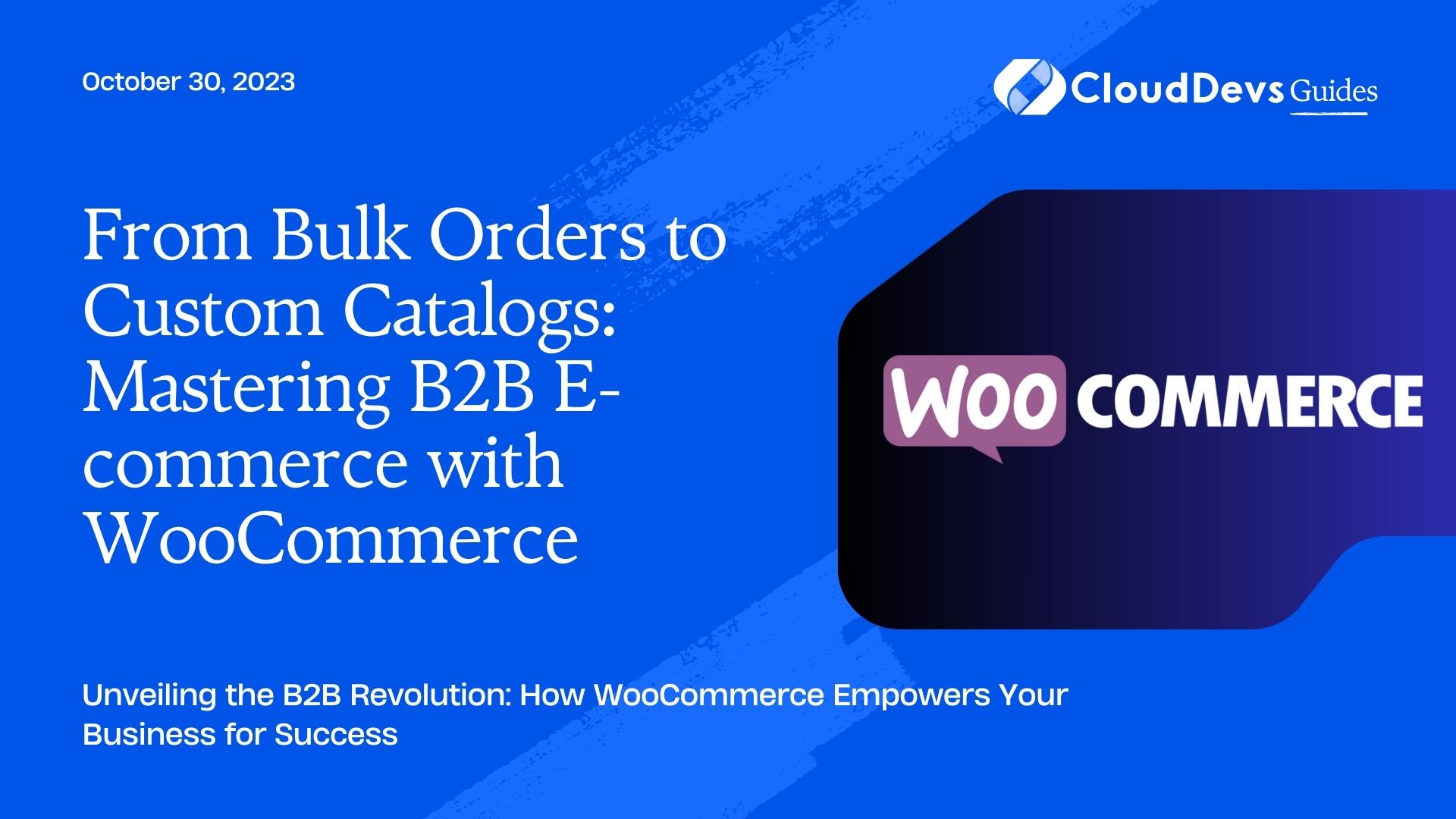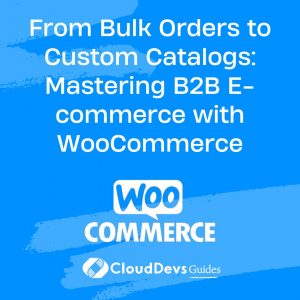From Bulk Orders to Custom Catalogs: Mastering B2B E-commerce with WooCommerce
In today’s digital age, e-commerce has become the backbone of businesses across the globe. While most people associate e-commerce with B2C (Business-to-Consumer) transactions, B2B (Business-to-Business) e-commerce is equally vital, if not more so. B2B transactions often involve complex pricing structures, bulk orders, and unique customer relationships that require specialized solutions. WooCommerce, a popular e-commerce platform for WordPress, has emerged as a powerful tool for B2B e-commerce. In this blog post, we’ll explore how businesses can leverage WooCommerce for B2B transactions with real-world examples.

1. WooCommerce Overview
WooCommerce is an open-source, customizable e-commerce platform built specifically for WordPress. It’s known for its flexibility, scalability, and extensive library of plugins and themes. While WooCommerce is commonly associated with B2C businesses, it can be adapted effectively for B2B purposes.
2. Benefits of Using WooCommerce for B2B E-commerce
Let’s delve into the benefits of using WooCommerce for B2B e-commerce, along with practical examples:
2.1. User Roles and Permissions
One of the standout features of WooCommerce is its ability to create custom user roles and set granular permissions. This is crucial for B2B businesses, as they often have multiple stakeholders with different levels of access. For instance, a wholesale distributor can create a ‘Wholesaler’ user role, allowing them to access exclusive pricing, while a ‘Sales Representative’ role may have limited access to order history.
Example: A company that sells industrial machinery can create a ‘Dealer’ role, giving its authorized dealers access to special pricing, product catalogs, and marketing materials.
2.2. Custom Pricing and Discounts
B2B transactions frequently involve negotiation and tiered pricing based on order quantities. WooCommerce’s flexibility enables businesses to set up dynamic pricing rules easily.
Example: A paper supplier can offer tiered discounts for bulk orders, with discounts increasing as the order quantity rises. A customer ordering 100 reams of paper may receive a higher discount compared to someone ordering just 10 reams.
2.3. Integration with ERP Systems
Many B2B businesses rely on Enterprise Resource Planning (ERP) systems to manage inventory, orders, and customer data. WooCommerce offers seamless integration with various ERP solutions, streamlining operations and reducing the risk of errors.
Example: A manufacturer can integrate WooCommerce with their ERP system to automatically update inventory levels, ensuring that they never oversell products.
2.4. Customer-Specific Catalogs
In B2B e-commerce, not all customers have access to the same products or pricing. WooCommerce allows businesses to create customer-specific catalogs, showing only the products that a particular customer is authorized to purchase.
Example: A distributor of medical equipment can set up a catalog for each hospital they serve, displaying only the medical devices and supplies approved for that specific institution.
2.5. Quick Order Forms
For B2B buyers who know exactly what they want, WooCommerce offers quick order forms. These forms enable customers to enter product SKUs or item codes and add items to their cart rapidly, enhancing the efficiency of the ordering process.
Example: A foodservice distributor can implement quick order forms, allowing restaurant owners to reorder their standard ingredients with just a few clicks.
2.6. Advanced Reporting and Analytics
WooCommerce provides robust reporting and analytics features that are essential for B2B businesses to gain insights into customer behavior, track sales trends, and optimize marketing strategies.
Example: A software company can use WooCommerce’s analytics tools to identify which features of their product are most popular among their B2B customers, allowing them to prioritize development efforts.
3. Real-Life Success Stories
Let’s explore some real-life examples of businesses that have successfully leveraged WooCommerce for their B2B e-commerce needs:
3.1. Würth Industry North America
Würth Industry North America, a distributor of industrial products, implemented WooCommerce to create a seamless online experience for its B2B customers. They customized user roles, allowing different customers to access unique product catalogs and pricing. This approach boosted their online sales significantly.
3.2. BioHorizons
BioHorizons, a dental implant manufacturer, utilized WooCommerce to sell their products to dental professionals worldwide. With WooCommerce’s integration capabilities, they connected their online store to their ERP system, ensuring accurate order processing and inventory management.
3.3. Renogy
Renogy, a solar power equipment supplier, embraced WooCommerce to serve both B2C and B2B customers. They implemented custom pricing rules and created a user-friendly portal for their wholesalers, resulting in increased B2B sales.
Conclusion
WooCommerce is a versatile e-commerce platform that can be tailored to meet the unique needs of B2B businesses. From custom user roles and pricing to seamless ERP integration and specialized catalogs, WooCommerce offers a range of features that can elevate the B2B e-commerce experience.
In today’s competitive market, businesses must adapt and embrace technology to remain competitive. By leveraging WooCommerce, B2B companies can streamline their operations, enhance customer satisfaction, and drive growth. As demonstrated by real-world examples, the possibilities are limitless when it comes to using WooCommerce for B2B e-commerce. So, whether you’re a distributor, manufacturer, or service provider, consider WooCommerce as your trusted partner in the world of B2B e-commerce.
Table of Contents







